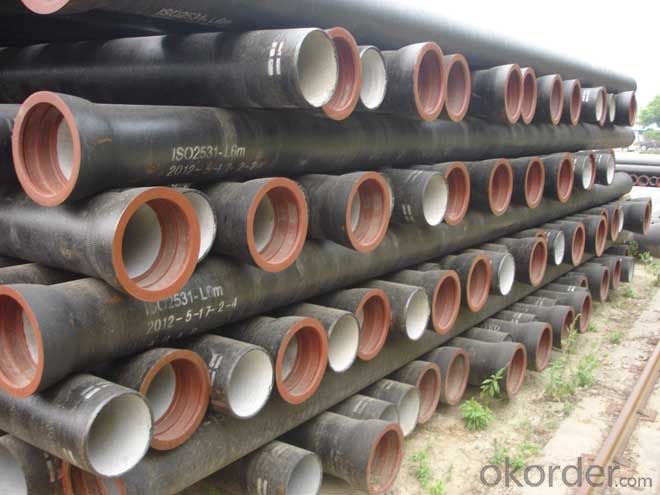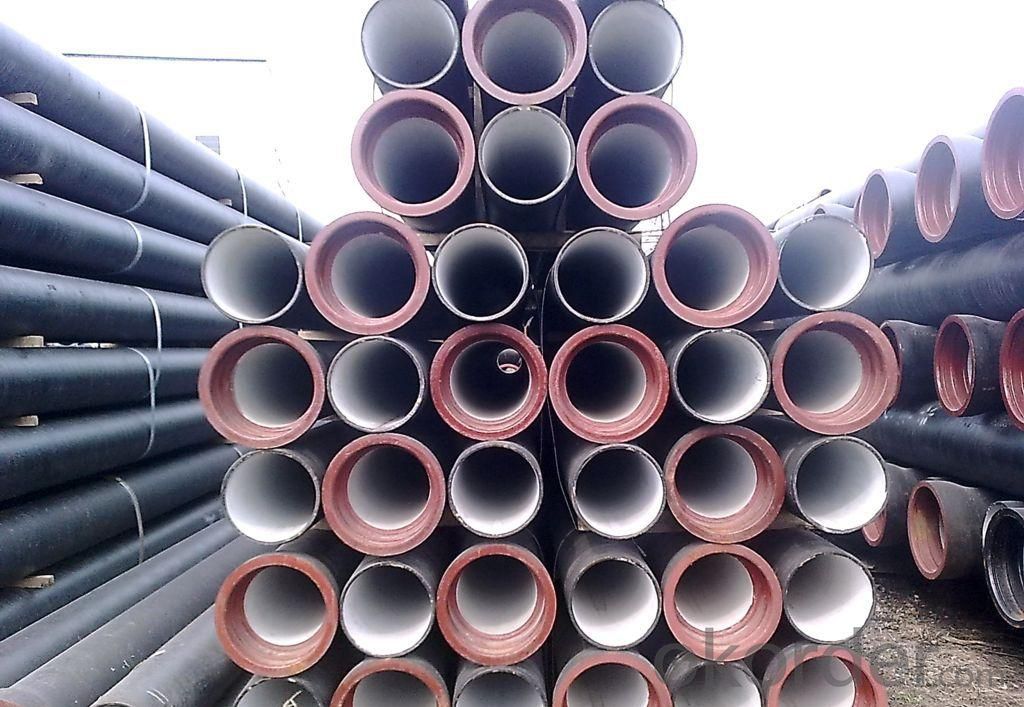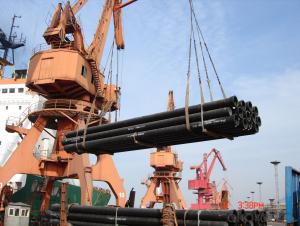Ductile Iron Pipe ISO2531 / EN545 / EN598 DN300
- Loading Port:
- China main port
- Payment Terms:
- TT OR LC
- Min Order Qty:
- 25 m.t.
- Supply Capability:
- 100000 m.t./month
OKorder Service Pledge
OKorder Financial Service
You Might Also Like
1.Ductile Iron Pipe Description :
1) Pipes confirm to ISO2531,K9 class,T type joint,6m long,with inside cements lining conform to ISO4179, outside Zinc spraying(130g/m2) and bitumen coating(70μm) conform to ISO8179.
2) Pipe ends: Spigot and socket ends, with 100% SBR rubber gaskets accoding to ISO4633
3) we can do third party inspection according to customer's request.
4) Our products have been sold to many international market, such as Middle East and South East Asia and Africa.
2.Main Features of the Ductile Iron Pipe:
1).Quality guarantee
• Chemical checking
• NDE after rough machining
• Mechanical testing after heat treatment
• Final NDE,dimension inspected
2).Quality document
• Full Q.A document as per client request
3).Service
• Drawing: we can translate your original drawing, offer best suggestion on design
• Quality: we have full set quality control system to guarantee the best quality.
• Inspection: inspect in house, all our products must be checked 3 times before packing
4)Inspection
• In-house Foundry
• Third party inspection available upon requirement
3.Ductile Iron Pipe Images:


4.Ductile Iron Pipe Specification:
Place of Origin: China (Mainland)
Model Number: DN80-1600
Length: 6M/5.7M/NEGOTIATED
Standard: ISO2531 / EN545
Application: Potable/Sewage Water
Diameter: DN80-1600
Hardness: 230
Pipe Wall Thickness: standerd
Pull Strength: 420
Yield (≥ MPa): 300
Material: Ductile Iron
5.FAQ:
1.Q: Why would you choose ductile iron pipe rather than other pipe materials?
A:The reasons are obvious for that not only ductile iron pipe possesses the inherent strength and flexibility of ductile iron, combined with proven corrosion protection systems, but also the cost savings can be achieved from design to installation and commissioning.
2.Q:Why can you guarantee the inner of pipes can’t be corroded?
A: High alumina cement mortar lining and sulphate-resistant cement mortar lining. These two special linings are applicable to inner anti-corrosion for sewage pipes, improving resistance to erosion of the sewage components.
- Q:Are ductile iron pipes suitable for potable water distribution systems?
- Yes, ductile iron pipes are suitable for potable water distribution systems. Ductile iron is a type of cast iron that is known for its high strength and durability, making it an excellent choice for conveying drinking water. These pipes are resistant to corrosion, which is essential for maintaining the quality and safety of potable water. Additionally, ductile iron pipes have a smooth interior surface, which helps to minimize the accumulation of sediments and biofilms that can affect water quality. They also have the ability to withstand high pressure and temperature changes, making them suitable for various potable water distribution systems. Overall, ductile iron pipes are a reliable and widely used option for ensuring the delivery of safe and clean drinking water to communities.
- Q:What is the expected joint restraint method for ductile iron pipes?
- Typically, when it comes to joint restraint methods for ductile iron pipes, the two commonly used options are mechanical joints or push-on joints. Both of these joint types are reliable and prevent leaks, ensuring the stability and integrity of the pipeline system. Mechanical joints involve the use of rubber gaskets and bolts to tightly seal the joints, while push-on joints rely on a groove and rubber gasket system to create a watertight seal. Both methods have excellent joint restraint capabilities and allow for the smooth transmission of fluids or gases through the pipeline without any risk of joint separation or failure. Moreover, these joint restraint methods also make installation and maintenance easier, which is why they are often preferred for ductile iron pipe systems.
- Q:Can ductile iron pipes be used for geothermal energy systems?
- Yes, ductile iron pipes can be used for geothermal energy systems. Ductile iron is a strong and durable material that can withstand the high temperatures and pressures often associated with geothermal energy systems. Its resistance to corrosion and high tensile strength make it an ideal choice for transporting geothermal fluids. Additionally, ductile iron pipes can be easily joined, allowing for flexibility and adaptability in design and installation. Overall, ductile iron pipes are a reliable and cost-effective option for geothermal energy systems.
- Q:Can ductile iron pipes be used for water supply networks?
- Yes, ductile iron pipes can be used for water supply networks. Ductile iron pipes are known for their strength, durability, and resistance to corrosion, making them an ideal choice for transporting water. Additionally, their flexibility allows for easy installation and maintenance, making them a popular option for water supply networks.
- Q:How much is the installation of cast iron pipe drainage 1 meters?
- From the tightness and corrosion resistance, ductile pipe sealing better after installation, but also can improve the corrosion resistance of corrosion protection through a variety of means; from the hydraulic performance, because ductile pipe specifications generally refers to the inner diameter of PE pipe diameter specifications generally refers to the same specifications, because under the condition of ductile pipe can achieve more runoff large; from the installation and maintenance cost, ductile pipe have more favorable price. The inner wall of zinc spray, anti-corrosion materials such as cement mortar.
- Q:How long is the service life of the cast iron pipe, and the time of use of ductile iron pipes?
- When it comes to the service life of nodular cast iron, its maintenance is essential for its long service life. Then, the focus of the maintenance of ductile iron pipe is to pay special attention to, will affect the long-term use of ductile iron pipes, stable operation of socket, row, etc., we should make efforts to these aspects of the mouth without debris. Make sure that the rubber ring of the ductile iron pipe has been smashed with a rubber hammer, and it is not twisted or twisted, and it is uniformly stuck in the slot. Ductile iron pipe in the maintenance process, because of the pneumatic tube axis is buried into the ground, so in the face of a tilt angle of the time, we must be careful, if the resistance is too large, will not force the excavation, in order to prevent the distortion of the rubber ring.
- Q:Can ductile iron pipes be used for underground slurry pipelines?
- Underground slurry pipelines can utilize ductile iron pipes, as they possess strength, durability, and resistance to corrosion, making them suitable for various applications. Their qualities make them reliable and cost-effective in transporting mixtures of solids and liquids over long distances. Ductile iron pipes can endure the abrasive nature of slurry and the external loads associated with underground installation, owing to their inherent toughness and flexibility. Moreover, they can be easily connected through different methods, ensuring a secure and leak-free pipeline system. Nonetheless, it is crucial to assess the specific properties of the slurry being transported and seek professional advice to determine the suitable pipe specifications and design considerations for the underground slurry pipeline.
- Q:What is the internal lining used in ductile iron pipes?
- The internal lining used in ductile iron pipes is typically a cement mortar lining.
- Q:The design uses water supply ductile iron pipe, PE corrosion protection pipe, HDPE pipe, please ask that good? What's the price of the two?
- PE pipe is hot melt connection (with thick wall smooth type, don't use the wavy), has the advantages of convenient connection, not affected by terrain, but should pay attention to cold and rain when try not to do, otherwise easily lead to cracks or Water Leakage interface touch interface. The disadvantage is not pressure, heavy machinery on the flat, but the problem is not, as long as the water does not leak, do not need to redo. Also, PE price volatility is relatively large, the size of the price difference is relatively large, a few more runs to ask the price.
- Q:What is the expected noise reduction of ductile iron pipes?
- The expected noise reduction of ductile iron pipes can vary depending on several factors, including the specific characteristics of the pipe material and design, the installation method, and the surrounding environment. However, generally speaking, ductile iron pipes have been found to provide significant noise reduction compared to other pipe materials. Ductile iron pipes are known for their superior acoustic performance due to their dense and robust construction. The material's high density helps to absorb and dampen noise vibrations, reducing the transmission of sound waves through the pipe. Additionally, the smooth internal surface of ductile iron pipes minimizes turbulence and friction, further contributing to noise reduction. Various studies and field tests have shown that ductile iron pipes can achieve noise reductions ranging from 10 to 20 decibels (dB) or even higher, depending on specific conditions. These noise reductions can significantly improve the acoustic environment in areas where the pipes are used, such as residential areas, hospitals, or schools. It is important to note that while ductile iron pipes can provide substantial noise reduction, other factors such as pipe connections, fittings, and valves can affect the overall acoustic performance. Proper installation techniques, including the use of effective seals and dampers, can further enhance noise reduction. In conclusion, ductile iron pipes are expected to deliver notable noise reduction benefits due to their dense construction, smooth internal surface, and efficient installation methods. However, it is essential to consider the specific project requirements and consult with professionals to determine the expected noise reduction levels based on the particular circumstances.
1. Manufacturer Overview |
|
|---|---|
| Location | |
| Year Established | |
| Annual Output Value | |
| Main Markets | |
| Company Certifications | |
2. Manufacturer Certificates |
|
|---|---|
| a) Certification Name | |
| Range | |
| Reference | |
| Validity Period | |
3. Manufacturer Capability |
|
|---|---|
| a)Trade Capacity | |
| Nearest Port | |
| Export Percentage | |
| No.of Employees in Trade Department | |
| Language Spoken: | |
| b)Factory Information | |
| Factory Size: | |
| No. of Production Lines | |
| Contract Manufacturing | |
| Product Price Range | |
Send your message to us
Ductile Iron Pipe ISO2531 / EN545 / EN598 DN300
- Loading Port:
- China main port
- Payment Terms:
- TT OR LC
- Min Order Qty:
- 25 m.t.
- Supply Capability:
- 100000 m.t./month
OKorder Service Pledge
OKorder Financial Service
Similar products
New products
Hot products
Related keywords



























